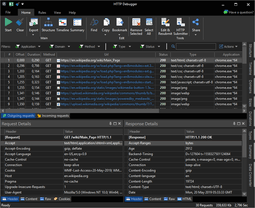An HTTP sniffer is a tool that intercepts and monitors web traffic (HTTP and HTTPS) between a client and the internet. It allows developers and network administrators to capture HTTP requests and responses, inspect their details, and analyze communication between clients and servers. In this guide, we’ll focus on HTTP sniffer usage, types, and features – and how they can help in web development, debugging, and security analysis.
What Is an HTTP Sniffer?
An HTTP sniffer is a specialized type of network traffic analyzer for the HTTP protocol. It decodes HTTP(S) traffic (both requests and responses) and presents it in a human-readable form. This includes HTTP headers, cookies, request methods (GET, POST), URLs, status codes, response bodies, and more.
HTTP sniffers intercept traffic using one of several methods: network card promiscuous mode, proxy servers, or OS-level API hooks. Modern sniffers also support HTTPS decryption by acting as a MITM proxy with a temporary root certificate installation.
Unlike browser DevTools, an HTTP sniffer can capture all HTTP(S) traffic from any application on your system. This includes:
- - Debugging API issues
- - Inspecting authentication and header values
- - Diagnosing slow network responses

Types of HTTP Sniffers
- - Online HTTP Sniffers: Web-based tools that fetch a URL and display the response. Useful for basic checks only.
- - Proxy HTTP Sniffers: Capture traffic through a proxy server. Require proxy configuration and SSL certificate installation: Example Telerik Fiddler.
- - Application (Software) Sniffers: Capture all system HTTP/S traffic without proxy setup. Example: HTTP Debugger Pro.
HTTP Sniffers for API Developers
API developers benefit from advanced sniffer features like full request/response views, syntax-highlighted JSON, filtering, search, and the ability to replay and modify requests.
For example, HTTP Debugger Pro displays real-time HTTP traffic across the system. You can inspect:
- - Full request and response headers
- - POST data and query strings
- - API call payloads

HTTP Sniffers for Security and Network Administration
Administrators use HTTP sniffers to detect network anomalies, debug network issues, and trace security breaches. Use cases include:
- - Detecting malware communication over HTTP(S)
- - Analyzing suspicious headers or payloads
- - Monitoring HTTP status codes and performance bottlenecks

Conclusion
HTTP sniffers are powerful tools for developers and DevOps. They enable deep visibility into HTTP/S traffic, making debugging and security monitoring much easier. Tools like HTTP Debugger Pro simplify the entire process with a rich GUI, no proxy setup, and decoding SSL traffic out of the box.
Whether you're debugging a failing API call or tracking malware communication, HTTP sniffers provide the clarity needed to resolve problems fast.
FAQ: Common Questions about HTTP Sniffers
How HTTP sniffers different from Wireshark?
Wireshark captures all network traffic, including low-level protocols. HTTP sniffers focus on HTTP only, may decode SSL traffic, and provide cleaner views and debugging tools.
Can HTTP sniffers capture HTTPS?
Yes. Most use a self-signed certificate to intercept and decrypt SSL/TLS traffic securely with your consent.
Is using an HTTP sniffer legal?
Yes—when you are debugging API requests from your desktop application to an API server.
Why not just use browser DevTools?
DevTools only show browser-originated traffic. HTTP sniffers capture all system traffic, including traffic from desktop apps and background processes. Moreover, when a request is blocked by CORS, browsers usually suppress the server response and show only a “blocked by CORS policy” error, making debugging difficult.




